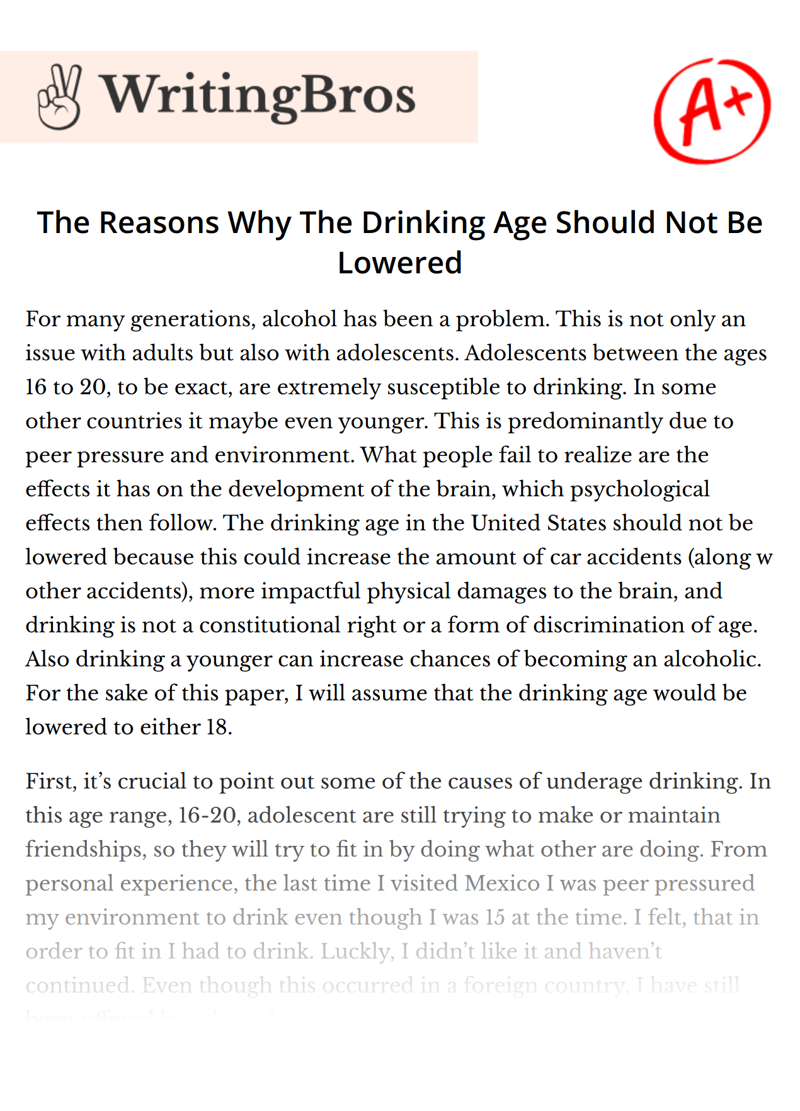The Reasons Why The Drinking Age Should Not Be Lowered

For many generations, alcohol has been a problem. This is not only an issue with adults but also with adolescents. Adolescents between the ages 16 to 20, to be exact, are extremely susceptible to drinking. In some other countries it maybe even younger. This is predominantly due to peer pressure and environment. What people fail to realize are the effects it has on the development of the brain, which psychological effects then follow. The drinking age in the United States should not be lowered because this could increase the amount of car accidents (along w other accidents), more impactful physical damages to the brain, and drinking is not a constitutional right or a form of discrimination of age. Also drinking a younger can increase chances of becoming an alcoholic. For the sake of this paper, I will assume that the drinking age would be lowered to either 18.
First, it’s crucial to point out some of the causes of underage drinking. In this age range, 16-20, adolescent are still trying to make or maintain friendships, so they will try to fit in by doing what other are doing. From personal experience, the last time I visited Mexico I was peer pressured my environment to drink even though I was 15 at the time. I felt, that in order to fit in I had to drink. Luckly, I didn’t like it and haven’t continued. Even though this occurred in a foreign country, I have still been offered by other who are also underage. So if underage kids have access to alcohol already, when its legalized they would most likely abuse it. As discussed in the article, “A Developmental Perspective on Alcohol and Youths 16 to 20 Years of Age.” by Sandra A. Brown, peer relations are a huge factor on the level of alcohol consumption. If the people around these adolescents that are like-minded, then they feel like they should also join in these activities. Then, they also underestimate the amount of alcohol being consumer which leads them to become even heavier drinkers.
Late adolescent years are a crucial period of development. This is the time where adolescents are becoming more responsible and making their own decisions in life. Biologically speaking, this is the time where the that “this emerging view of adolescent … of continued neuroplasticity brings with recognition that is also a period of vulnerability to neurotoxic processes, including attributes to heavy alcohol exposure.” Basically, the plasticity of the brain makes it vulnerable to the heavy consumption of alcohol, leading to the effects of the brain that could have been avoided. If the drinking age is lowered, the development of the brain in in danger. This is also discussed by the National Institute of Alchohol Abuse and Alchiohims (NIH), stating that interfere with the usual development of the brain which could also lead to a risk of developing AUD. And AUD is an disease characterized by uncontrolled drinking and preocupacional, according to the Mayo Clinic. The brain of these adolescents would be tampered with and would impact the growth leading to problems in the future that could have been avoided.
Underage drinking could also lead to earlier alcoholism. In the NIH website, they talk about the correlation between early age drinking and alcoholism. Although this article is a bit outdated, the data seems to be accurate. In another source, Addiction Center, they state that teens are more prone to binge drink because their impulse control has not fully developed. It would be safe to assume that if they are binge drinkers at a young age then they most likely would become alcoholics in the future. Lowering the law would increase the chances of adolescents to be alcoholics and that would not be good for them or for society.
This could lead to social problems in their adulthood because it's more than likely, if they are excessive and compulsive with their drinking, it could lead to legal repercussions. Adolescents drinking could also lead to them dropping out of school, problems with friends and family, fights, etc. Its could also increase the chances of acute injuries such as car accidents, bars overflowing, among other things.
However, many people argue that at age 18, teens are given far more important responsibilities that are worse than drinking. For instance, they are allowed to join the military, where they are risking their life killing the enemy or when they have to accept that fact that they could be charged as an adult. Also smaller stuff that may compare, for example, buying cigarettes. Why are teen able to do these things but not able to decide whether they can drink or not. A solution proposed by this group is that the government establish groups/classes to teach adolescents how to drink responsibly. Yet, according to Kerri A. Quintal, a website dedicated to the law, drinking is not a fundamental law protected by the constitution, age is not, in this case, used to be discriminatory, and using the drinking age as a “rational basis” is better at preventing car accidents according to scientific evidence. Also, the groups that the people for the lowering of the drinking age talked about, are shown to help but only a handful of them. This is due to the fact that teens are somewhat prideful to seek help and admit their problem.
In conclusion, after looking at all the negative effects alcohol has for the underage, the drinking age should therefore, not be lowered. The way alcohol affects the brain negatively, especially with younger people. The long term effects of alcoholism as well. And the danger that could cause to society and in their individual lives as well. Regardless of the fact, that some may be doing it anyways, it should not be legalized because it would an increase in alcoholism.
Cite this Essay
To export a reference to this article please select a referencing style below

